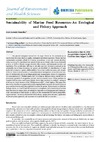Identificador persistente para citar o vincular este elemento:
https://accedacris.ulpgc.es/jspui/handle/10553/23056
| Campo DC | Valor | idioma |
|---|---|---|
| dc.contributor.author | González Pérez, José Antonio | en_US |
| dc.date.accessioned | 2017-08-05T02:33:16Z | |
| dc.date.accessioned | 2018-03-15T14:29:36Z | - |
| dc.date.available | 2017-08-05T02:33:16Z | |
| dc.date.available | 2018-03-15T14:29:36Z | - |
| dc.date.issued | 2016 | en_US |
| dc.identifier.issn | 2378-6841 | en_US |
| dc.identifier.uri | https://accedacris.ulpgc.es/handle/10553/23056 | - |
| dc.description.abstract | The present viewpoint summarizes the major threats to the sustainability of marine food resources from an applied ecological and fishery approach. Threats include unsustainable activities related to fisheries, aquaculture, urban and tourism development, marine traffic, introduced and spread of non-native species, other human industrial actions, as well as climate change, invasive alien species, and inadequate policies and legislation. This contribution still aims to identify main key elements concerned in the sustainable use of these resources; six groups are identified: (1) identification of main exploited commercial species, differentiation from other similar resources, and normalization of their common names; (2) ecosystem-based management of coastal ocean waters; (3) biodiversity, taxonomic biogeography and oceanographic forces; (4) responsible fish consumption; (5) ‘‘Mediterranean diet”; (6) fisheries biology studies, mainly with an ecosystem approach. A comparison between most-consumed native fishing products in Spanish Mediterranean and Canary Islands shows high similarity in seafood, putting in evidence the broad presence of the “Mediterranean diet” in both regions. This paper also aims to be a baseline to support and identify ongoing/further measures for conservation of associate biodiversity and main exploited commercial species. Some remarks on fisheries biology studies, as a useful tool for assessment, management and conservation of marine food resources are made; these are related to: regulations of fishing gear and fishing activity; assessments of their impact as well as of the commercial fish stocks potentiality; improvement of the statistical control of fish landings; marine protected areas; application of the ecosystem approach; and awareness of responsible fish consumption. | en_US |
| dc.format | application/pdf | es |
| dc.language | eng | en_US |
| dc.relation.ispartof | Journal of Environmental Health Science and Engineering | en_US |
| dc.rights | by-nc-nd | es |
| dc.source | Journal of Environmental & Health Sciences [ISSN 2378-6841], v. 2 (2), p. 1- 5 | en_US |
| dc.subject | 251092 Acuicultura marina | en_US |
| dc.title | Sustainability of marine food resources – an ecological and fishery approach | en_US |
| dc.type | info:eu-repo/semantics/article | en_US |
| dc.type | Article | en_US |
| dc.identifier.doi | 10.15436/2378-6841.16.1027 | en_US |
| dc.identifier.absysnet | 2378-6841 | es |
| dc.description.lastpage | 5 | - |
| dc.identifier.issue | 2 | - |
| dc.description.firstpage | 1 | - |
| dc.relation.volume | 2 | - |
| dc.investigacion | Ciencias | en_US |
| dc.rights.accessrights | info:eu-repo/semantics/openAccess | es |
| dc.type2 | Artículo | en_US |
| dc.identifier.ulpgc | Sí | es |
| dc.description.sjr | 0,506 | |
| dc.description.jcr | 0,338 | |
| dc.description.sjrq | Q1 | |
| dc.description.jcrq | Q4 | |
| dc.description.scie | SCIE | |
| item.grantfulltext | open | - |
| item.fulltext | Con texto completo | - |
| crisitem.author.orcid | 0000-0001-8584-6731 | - |
| crisitem.author.fullName | González Perez, Jose Antonio | - |
| Colección: | Artículos | |
Visitas
351
actualizado el 15-ene-2026
Descargas
218
actualizado el 15-ene-2026
Google ScholarTM
Verifica
Altmetric
Comparte
Exporta metadatos
Los elementos en ULPGC accedaCRIS están protegidos por derechos de autor con todos los derechos reservados, a menos que se indique lo contrario.
